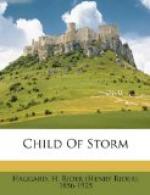Now, although I take it out of its strict chronological order, the first of these histories that I wish to preserve is in the main that of an extremely beautiful woman—with the exception of a certain Nada, called “the Lily,” of whom I hope to speak some day, I think the most beautiful that ever lived among the Zulus. Also she was, I think, the most able, the most wicked, and the most ambitious. Her attractive name—for it was very attractive as the Zulus said it, especially those of them who were in love with her—was Mameena, daughter of Umbezi. Her other name was Child of Storm (Ingane-ye-Sipepo, or, more freely and shortly, O-we-Zulu), but the word “Ma-mee-na” had its origin in the sound of the wind that wailed about the hut when she was born.*
[*—The Zulu word “Meena”—or more correctly “Mina”—means “Come here,” and would therefore be a name not unsuitable to one of the heroine’s proclivities; but Mr. Quatermain does not seem to accept this interpretation.—Editor.]
Since I have been settled in England I have read—of course in a translation—the story of Helen of Troy, as told by the Greek poet, Homer. Well, Mameena reminds me very much of Helen, or, rather, Helen reminds me of Mameena. At any rate, there was this in common between them, although one of them was black, or, rather, copper-coloured, and the other white—they both were lovely; moreover, they both were faithless, and brought men by hundreds to their deaths. There, perhaps, the resemblance ends, since Mameena had much more fire and grit than Helen could boast, who, unless Homer misrepresents her, must have been but a poor thing after all. Beauty Itself, which those old rascals of Greek gods made use of to bait their snares set for the lives and honour of men, such was Helen, no more; that is, as I understand her, who have not had the advantage of a classical education. Now, Mameena, although she was superstitious—a common weakness of great minds—acknowledging no gods in particular, as we understand them, set her own snares, with varying success but a very definite object, namely, that of becoming the first woman in the world as she knew it—the stormy, bloodstained world of the Zulus.
But the reader shall judge for himself, if ever such a person should chance to cast his eye upon this history.
It was in the year 1854 that I first met Mameena, and my acquaintance with her continued off and on until 1856, when it came to an end in a fashion that shall be told after the fearful battle of the Tugela in which Umbelazi, Panda’s son and Cetewayo’s brother—who, to his sorrow, had also met Mameena—lost his life. I was still a youngish man in those days, although I had already buried my second wife, as I have told elsewhere, after our brief but happy time of marriage.
Leaving my boy in charge of some kind people in Durban, I started into “the Zulu”—a land with which I had already become well acquainted as a youth, there to carry on my wild life of trading and hunting.




